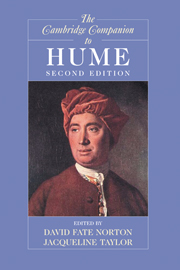Book contents
- Frontmatter
- 1 An Introduction to Hume’s Thought
- 2 Hume’s New Science of the Mind
- 3 Hume and the Mechanics of Mind: Impressions, Ideas, and Association
- 4 Hume’s Theory of Space and Time in Its Skeptical Context
- 5 Hume on Causation
- 6 Hume and the Problem of Personal Identity
- 7 Hume’s Skepticism
- 8 Hume’s Moral Psychology
- 9 The Foundations of Morality in Hume’s Treatise
- 10 Hume’s Later Moral Philosophy
- 11 The Structure of Hume’s Political Theory
- 12 Hume’s Principles of Political Economy
- 13 Hume on the Arts and “The Standard of Taste”: Texts and Contexts
- 14 David Hume: “The Historian”
- 15 Hume on Religion
- Appendix: Hume’s Autobiographies
- Selected Bibliography
- Index
- Series List
15 - Hume on Religion
Published online by Cambridge University Press: 28 May 2009
- Frontmatter
- 1 An Introduction to Hume’s Thought
- 2 Hume’s New Science of the Mind
- 3 Hume and the Mechanics of Mind: Impressions, Ideas, and Association
- 4 Hume’s Theory of Space and Time in Its Skeptical Context
- 5 Hume on Causation
- 6 Hume and the Problem of Personal Identity
- 7 Hume’s Skepticism
- 8 Hume’s Moral Psychology
- 9 The Foundations of Morality in Hume’s Treatise
- 10 Hume’s Later Moral Philosophy
- 11 The Structure of Hume’s Political Theory
- 12 Hume’s Principles of Political Economy
- 13 Hume on the Arts and “The Standard of Taste”: Texts and Contexts
- 14 David Hume: “The Historian”
- 15 Hume on Religion
- Appendix: Hume’s Autobiographies
- Selected Bibliography
- Index
- Series List
Summary
Hume's critique of religion and religious belief is, as a whole, subtle, profound, and damaging to religion in ways that have no philosophical antecedents and few successors. Some of the damage and a little of the subtlety will, I trust, become evident in Part II of this essay, where Hume's seminal discussions of the design argument for the existence of God, miracles, morality, and natural belief are examined. Before this, however, certain preliminaries need attention. First, there is the difficulty caused by the old-fashioned or unfamiliar terminology used by Hume and his commentators in describing and assessing what he has to say. Second, although the scale of Hume's writing on religion is reasonably obvious (it exceeds his output concerning any other subject except history), the fact that it is dispersed over a number of publications and partly embedded (sometimes none too clearly) in several more, as well as having to be drawn from essays, letters, and minor writings, needs to be understood before any informed discussion is possible. Third, there is the problem of seeing what he wrote not as ad hoc criticisms turned out piecemeal, but as a comprehensive critical strategy. Finally, a problem of interpretation results from Hume's “abundant prudence” in covering his real opinions with ambiguous irony and even, on occasions, with denials of his own apparent conclusions.
- Type
- Chapter
- Information
- The Cambridge Companion to Hume , pp. 480 - 514Publisher: Cambridge University PressPrint publication year: 2008
- 2
- Cited by

